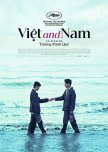
This review may contain spoilers
Awful
That's not to say the film-making is awful. But this story will devastate you.**CW: domestic violence, rape**
If you're not one yourself, you would likely be well aware of the intensity that comes with being a true fangirl. In this case, Jane is a typical pop fangirl, willing to go to extreme lengths to be in the presence of her idol, Paulo. She attends a fan event and semi-accidentally ends up in the back of Paulo's ute. He starts driving home, unaware of his passenger.
Paulo's public-facing mask slips quickly but it takes more than a couple of uncouth moments for Jane's fantasy to falter. With Jane trying to play adult, even after Paulo reveals his true character at home, events spiral into darkness. The contrast between the idol she revered and the mundane man before her is shattering.
Now, it's at this point where I feel iffy about this film. Paulo rapes Jane. And while it may not look like it on the surface, this is the point of rupture for Jane.
If you've ever had even passing knowledge of pop idol stans, you would know that sexual fantasies play an important (even if not always outrightly acknowledged) role in a lot of fan culture. The online proliferation of fan-created smut is testimony.
Consequently, we fully expect that Jane has had similar fantasies around sleeping with her idolised image of Paulo. The rupture occurs because when the encounter does happen in real life, it's literally and metaphorically a painful departure from the daydreams.
The rape scene also marks a turning point in Jane's own character development for the final part of the film. It's after this stage that she starts identifying Paulo's abusive behaviour with that of her mother's abusive partner.
I'm iffy about the rape scene because I'm not sure the full gratuity was necessary. However, I don't think censoring it would've really helped so perhaps it does have a place.
In light of the ambivalent ending of the film – (which I liked, with it's cynicism or hope, depending on how you read it) – the story would've likely have packed a bit less of a punch.
I was absolutely wrecked when I first finished this film and originally tried to forget it. But now that a bit of time has passed and I've rewatched the ending, I think it's brutality is its selling point.
It's a reminder as to why we use idol fandom as a form of escapism in the first place. The sweet manufactured nature of pop culture appeals because it's so remote from real life. Who wouldn't jump in the back of their idol's car when given the chance?
Was this review helpful to you?

A wholesome and fun YA drama with some refreshing originality
I was intrigued by the premise of The Underclass: a school where everything hinges on academic rankings. I had no idea what BNK48 even was until I'd finished the the series and read the other reviews here so that connection wasn't a factor for me.For me, the appeal was how the drama depicted the joy and struggle of teens figuring themselves out while simultaneously combatting unfair demands and expectations. It did so without being overtly didactic or condescending.
Although there were very recognisable clichés underpinning the entire series, there were also moments of refreshing originality in certain character dynamics and plot points. Most of the characters felt real (with the exception of the more artificial 'bad guys') and, despite the clichés, the school ranking system was actually only a slight exaggeration of my own school experience. I found a lot of my teenage-self in the characters.
That said, at times the ensemble cast felt a little unwieldy – there were perhaps one or two supporting actors too many – but the acting quality itself was of okay quality among the cast. Some of the production quality was patchy every now and then.
Overall, this is a fun Young Adult drama with a good mix of originality and reliable tropes to make it an easy watch.
Was this review helpful to you?

Just as problematic as the Taiwanese original :/
Ok so I only watched this because I watched the original Taiwanese versions so many times (which I think I only ever really liked because it was the first Mando-language drama I ever watched). I was really hoping they wouldn't repeat the same ultra problematic coercive control theme for this version, but they have. To more or less the exact same degree as the original which is a shame (and hence the low rating).Otherwise, I do feel like this version has a couple of things going for it. First, I am so grateful they changed the story timeline for this version. Because holy moly, the amount of flashback scenes in the original Taiwanese version was incredibly jarring and confusing. This version tells the story more or less chronologically which has saved a lot of grief.
Second, I liked how Ou Chen was written in this version compared to the Taiwanese. No shade on Peter Ho, I think this was a case of scripting rather than acting. Personally I found this version of Ou Chen a lot more believable than the Taiwanese one. He's also a bit more likeable/human in this version because has his business partners alongside him (rather than the Taiwanese version who was a clear loner).
Luo Xi's character I found more or less on par with the original. Other reviews noted that he seems to be younger in this version but if anything, I think that actually might work better in explaining his character's level of immaturity.
I know I said in my review of the Taiwanese version that Barbie Hsu was a bit lacklustre as Xia Mo compared to other roles she's done. But that said, the one thing she did get spot-on was the 'ice princess' side to Xia Mo's character profile. I found Zhang Xue Ying to be a solid all-rounder though without any real stand out moments.
A couple of things I was really disappointed by were, first, a secondary love story that did exist in the Taiwanese one but only as subtext (not being specific to avoid spoilers). Honestly, it should've stayed as subtext because I skipped most of that storyline in this version of the drama. Second, the music in this version was pretty poor compared to the Taiwanese version. The key difference there is that Barbie Hsu and Peter Ho are professional singers and so were able to contribute their voices.
Was this review helpful to you?

Gallows humour gives this some shine
Honestly, Gezhi Town is pretty stock-standard fare when it comes to Chinese war films. Or perhaps it's harder to stand out at the moment, given the impressive number of Chinese-produced WWII blockbusters to mark the 80th anniversary of Japan's defeat.Obviously, from a commercial perspective, the creators have played their cards well by casting Xiao Zhan as our long-suffering protagonist, Mo Dexian. He delivers a solid performance, though nothing overly remarkable. The same can be said for the rest of the cast.
For me, the highlight of Gezhi Town is the use of gallows humour. There's a little sprinkled at the beginning, but it doesn't really come into play until halfway through when the action is at full swing. This is what gives the film a bit of sparkle. Otherwise, it's the usual fight-against-the-odds playbook – which is all well and good – just nothing particularly special.
This film also gets some brownie points for having very believable characters. It's easy for war films to reduce people to cardboard cutouts, but Gezhi Town employs humour to show the clumsy human-ness of goodies and baddies alike.
Was this review helpful to you?

Pure camp joy
Hana Kimi is an absolute batsh1t crazy delight of a series. What this drama does so well is combine zany over-the-top comedy with beautifully sincere emotion. Disbelief? Suspended. Tears? Overflowing. And mind you, I rarely give out 10 star ratings.I've watched this series around half a dozen times and each time I get something new out of it. This is a massive credit to the writers who have deeply invested in their characters and have perfected the art of multi-level subtext. When I first watched this series in my early teens, I enjoyed it entirely at face value, rolling with the easy gags and appreciating the romance triangle.
Now, in my late 20s, I've been loving all the queer shenanigans going on just beneath the surface of Hana Kimi. Sure, there's heaps of queer stuff happening openly throughout the series, but it's really hard to describe just how camp this show is. And unapologetically so too. Sure, there's some queerphobic tropes at play – certainly a product of the time – but these are smothered with the overwhelmingly camp energy of the production.
I don't think you could make a series like this now. I think it would be condemned for being too "cringe" among the younger Gen Z crowd. I also think it would struggle to emerge from what is currently a big cinematic pile of Literalism. Which is a shame because, as my username suggests, I appreciate TV that is just a little bit unhinged.
Was this review helpful to you?

A thrill ride into an overlooked story
I'll be the first to admit I know very little about the Pacific Theatre of WWII. This may seem surprising given australia's geographical proximity and involvement in the fighting, but most of our nationalistic myth-making leans more into the WWI imagery than WWII.And as much as I would like to say a curiosity in history was the reason I chose to watch Dongji Rescue, I'd be lying. I was 98% there for the cast. And damn, did they deliver.
I didn't even recognise Zhu Yi Long, even though I finished a third re-watch of the Story of Minglan earlier this year. Boy, does he have range! Same goes for Wu Lei, who I've seen in a few things, but I felt like couldn't quite shake the child actor background until now. Yet despite their stellar performances, Ni Ni takes the cake. Her character doesn't feature much until the latter half of the movie, but from therein she steals the show.
The storyline is a classic thriller style, mixed with the usual tropes of Chinese films set in this era. Like every Cdrama, the white characters are super cringe. Thankfully, their parts are kept relatively short, and only one pom sticks around long enough to get a name. There seem to be two thematic strands in the movie: the moral obligation to save lives, and the fraternal bond between the male protagonists. The first is executed well, but the latter suffers with the movie focussing more on plot progression than character development.
With that in mind, I think they could've chopped out Ni Da Hong's character altogether. He was simply one character too many and didn't really do much other than give Ni Ni's character substance. Not that her character needed it. She had depth after just a few seconds on screen. The other drag for me was a couple of scenes that verged a bit too close to melodrama. Combined with the cringe poms, they did take me out of the film quite a lot.
That said, the underwater and on-water shooting was the best I've ever seen. I would love to see behind-the-scenes footage of how that was achieved because, in spite of my mild thalassophobia and claustrophobia, my eyes were glued to the screen.
Was this review helpful to you?

Arthdal Chronicles Part 1: The Children of Prophecy
1 people found this review helpful
Arthdal Chronicles was way more interesting than my political science degree
~Review of Part I only~Honestly, the political drama genre is almost dead to me at this pint. I'm sick of men in suits flouncing around parliament corridors pursued by journalists. I'm also tired of the high fantasy spin on the political drama genre which ends up just being an excuse to objectify women and showcase long-winded battle scenes. So I was thankful when I started watching Arthdal Chronicles for the breath of fresh air.
Part One – the first six episodes of the series – is all about the rich world-building. You're introduced to the characters, their settings, and the key political dynamics that set up the rest of the series.
These six episodes set the key themes for the rest of the series. These revolve around empire/nation building, racialisation, and spiritual agency. The show writers have been careful in their political crafting. They haven't just opted for a simple coloniser versus colonised binary, and instead have woven in layers of nuance right from the opening scene.
The writers also don't seem too keen on didacticism. The colonising act (trying to avoid spoilers here) is certainly depicted as cruel, but at this point the audience already has sympathy for characters on both sides. Ditto in regards to Neanthal, Igutu and Saram dynamics. This way, the characters and plot are able to achieve complexity and depth – the result being a beautifully rich world.
There's also something interesting happening with how the series treats religion/spirituality that means I'm refraining from calling this a fantasy series, but I'll get to that in my review for Part Two.
Was this review helpful to you?

A dance of optics, but with little emotional pull
The set-up of The Eight Hundred is immediately an intriguing one. A last Chinese battalion is left at an abandoned warehouse in Shanghai to make a final stand against the Japanese. Their struggle is not just one of bloodshed. It's also a performance.Because just a stone's throw across the river is the international concession where the Shanghai elite and entertainers – as well as foreign journalists – gaze on as the Chinese battalion endures assault after assault from the Japanese.
This dynamic is what makes this film stand out, in my opinion. You have this interesting dance of the concession-side watching the warehouse soldiers as if the entire thing is a show. But then you also have the soldiers watching the concession-side, pulled in by the dazzling performers and lights.
It's not only about watcher/watched either. Individuals from both sides attempt to make crossings from one side to the other. The film seems to refrain from judging the actions of anyone too harshly – including deserters and snobby journos – which keeps the watcher/watched dichotomy all the more fluid. Except the Japanese, of course. Their sole purpose in this film is to be condemned.
I think a lot of this analysis may be my projection, however. As ultimately, The Eight Hundred doesn't dwell with much depth on this interesting dichotomy. A massive chunk of run time is consumed by massive action scenes which, while essential for war films, are my least favourite part of the genre. (No shade to The Eight Hundred, I just don't like war films that much generally).
Normally, I can forgive super long battle scenes if there's strong emotional pull. Unfortunately, this was the big let down for me. The Eight Hundred tried to follow the storyline of too many characters. The result was breadth, but no depth.
Like c'mon, pleeeease, I'm such a sucker for having my heartstrings pulled. I can jump from six to eight stars so damn fast when you tap into my soft side, but The Eight Hundred missed the opportunity. Which is a shame. Because there were some potentially gorgeous characters, they simply weren't fleshed out.
Was this review helpful to you?

Swords spark but the pacing perishes
I went in to watch Last Samurai Standing with one desire: well choreographed swordplay. And the series certainly delivered there. Big tick from me.Also big tick for the death game format. I don't really understand the critique of 'we've seen this before'. I mean, we've seen heaps of spy movies before, but people keep returning to Mission Impossible and James Bond. Don't change a good thing, right? The death game set up is something I enjoy because it immediately introduces high stakes, not because there's anything novel about the trope.
Otherwise, I was pretty underwhelmed by Last Samurai Standing. There are too many characters with back stories, resulting in breadth rather than depth. Back stories should provide a) emotional attachment to a character and b) an explanation for their motivation. I found the former to be superficial at best, and the latter to be often too far-fetched.
So while I didn't mind any of the main characters, I wasn't too fussed about their fates. If I was interested in anyone, it was the Ainu character who received fleeting screen time and no backstory.
That said, this series has overall stellar production quality. There are more than just a few impressive shots, and the colour grading itself is beautiful. I'm curious to see in which direction the second season goes.
Was this review helpful to you?

Ask for a water pistol, get intergenerational trauma instead
This is an odd movie. Firstly, Above the Dust isn't your usual Chinese production. Chinese film faithfuls will note the lack of dragon seal in the opening credits: the usual sign a movie has passed Chinese government film regulations (i.e. censorship).Director Wang Xiaoshuai did submit Above the Dust for review, but he ended up having it screened overseas, after the censorship process dragged on.* And I can see why regulators would take issue with the film's substance. It casts a critical eye on the cultural revolution via the viewpoint of a family descended from a rural landlord.
Second, the movie is also odd in its storytelling approach. Narrating through the eyes of a modern-day child who encounters the ghost of his grandfather is a well used narrative device. Using the kid's obsession with a water pistol as a springboard into major political themes was a clever move.
However, it felt like narrative cohesion suffered due to split focus. It touched on family betrayal, connection to land, urbanisation, and contradictions within state governance. Yet with so much to chew on, I felt the storyline didn't delve deep enough for me to digest any of this properly.
In terms of visual style, I'm not sure why, but the blanched colour grading felt grating to me after a while. I know its purpose was to emphasise the dry land and provide a dream-like quality. However, to me I felt like it was...obscuring something? I don't know. I just kept constantly wondering what the scenery really looked like.
Still unsure if I can say whether I liked this film or not. I'll need to sit with this one for a bit.
-----
* Source: https://variety.com/2024/film/news/wang-xiaoshuai-china-berlin-above-the-dust-1235913938/
Was this review helpful to you?

Robin Hood plays it safe
Kundo feels as if some film bro wanted to play around with some Western genre tropes and picked up the first script that would suit his purpose.It's a typical Robin Hood style narrative. The underdog protagonist and his tight crew give their all as they fight against the tyrannical overlord. Swords swing, arrows fly. And a female character is even allowed a few lines.
The result is a patchwork of horses, fields, and fight scenes. And by patchwork, I mean patchy. The entire thing is very roughly sewn together. Once every 20 minutes there's an awkwardly inserted Western trope, after which the film awkwardly limps until the next one.
That said, there's a couple of well choreographed fight scenes in here that helped lift the production value a little. And just to help me get past the halfway mark is Kang Don Won who plays a captivating villain, aided by the fact that he's quite hot. Thank you for your service.
Was this review helpful to you?

One for the Austen girlies
To lovers of Pride and Prejudice: I strongly recommend The Story of Minglan. You will easily find familiarity in this drama. A sharp-minded protagonist. A well-off but extremely hectic family striving for status. Leisurely pacing to match the domestic world to which Minglan is mostly confined.The class perspective is also parallel. While there is much empathy for Minglan’s plight as the lowest on the rung within her own family, that empathy is not extended to the servants who follow the usual loyal/disloyal trope that I’ve spoken about in other reviews.
But it also feels a bit mean to make the Austen comparison. I found the Story of Minglan to be thematically richer than Pride and Prejudice. Here’s how:
1. The drama knows to condemn the Bingley character (Yuanrou) for his lack of backbone and perspective, no matter his polite manners and intent. Big thumbs up from me (My ex’s major flaw was lack of backbone,).
2. More importantly, the Story of Minglan acknowledges what so few Western romance stories do: a wedding isn’t the end. In this drama, a wedding can mark either relative freedom or eternal hell. It was quite convenient that Darcy’s parents in P&P are dead. Darcy’s domineering aunt is outside of the immediate household and so Elizabeth need not mind overbearing in-laws. On the other hand, all three Sheng sisters must contend with oppression in their new household in one form or another, whether that’s domineering in-laws or neglectful spouses. The man who Minglan ends up with is depicted as a perfect match not only because he understands the struggles of women but also because he accepts and celebrates her, warts and all.
3. The inner chambers are just as dangerous as any battlefield. While the patriarch may be the source of authority in the household, he is not always the wielder of power. These women wage war and men are factors in their calculations.
There’s much more I could praise about this drama. It’s beautifully intricate and the characters are superb thanks to exceptional acting. Give it a go.
Was this review helpful to you?

Laugh one minute, cry the next
I watched Post Truth while at home sick and it was exactly the heartfelt pick-me-up I needed. This movie is a seamless blend of comedy and sincerity, with everyone giving their all to the bit.The comedy element comes mostly from Wei Ping'an's wild goose chase as he hunts down the source of a bad rumour about a dead woman, Hu Lan, who he had briefly met when she had bought her grave plot from him. Special mention goes to Li Xue Win – who plays Ping'An's sister – for her performance in catfishing a guy essential to Ping'An's chase. This gag was extra funny as I definitely have friends who would do the exact same thing if called for.
The heartfelt part of the film comes from Ping'An's relationship with his daughter who, parallel to her father's quest, also grapples with doing the right thing, despite the steep cost. Their storyline was the perfect balance to the absurd hilarity that meant that Post Truth kept strong pacing.
A good romp if you need one.
Was this review helpful to you?

Hidden gem of a documentary
Hidden Letters is not an academic documentary. Instead it reveals history through the present, following two modern Nushu writers. Except for the opening frames (I'll address those below), the documentary is a delicate and thoughtful exploration of Nushu in its present form.The documentary explores the modern-day contestation around Nushu – through the women who engage with it – but also the opinions of men who think they know what they're talking about. (It turns out that mansplaining is the same in every language.) Unsurprisingly, it's the discussions between women about Nushu which come across as the most sincere.
The two Nushu writers meet with their own struggles as women, in part related to Nushu and in part related to their existence as women in a patriarchal society. Of course, these two things are enmeshed with one another. It is through their lives that Hidden Letters drives its emotions and messages.
For me, the only downside of this documentary is the opening frames. These are simply lines of text on a black background:
"For thousands of years, women in China were born to obey their husbands, fathers and sons.
Forbidden to read and write, their voices were silenced. Most left no record of their lives."
I'm not sure why Hidden Figures opens with such sa weeping, homogeneising statement (and in English too?). Particularly when what follows is a nuanced and complex insight into the evolution of Nushu. In a historical sense, Nushu itself was limited to the women of the inner chambers (and therefore not relevant to peasant women). But even saying "their voices were silenced" is in direct contradiction to the existence of Nushu itself – as well as other written records left by Chinese women of the past.
I'm not saying that oppression of women didn't exist - on the contrary, it was under such conditions that Nushu came into being – but I think Hidden Figures does itself a bit of injustice by opening with such a reductionist introduction to a deeply complicated form of communication.
That said, I highly recommend this documentary. It's well crafted and provides an intriguing insight into the intersection of Nushu and the everyday struggles of women.
Was this review helpful to you?

Meandering but exquisite cinematography
Still not sure how I feel about this film. Although at first glance, Viêt and Nam appears to be a romance, the complex storytelling makes it far bigger than just the story of two miners finding solace in one another.The film meanders, geographically and temporally, between the search for war martyrs and the vacillation of characters Viêt and Nam as they decide whether to leave the country. This film is exquisitely shot. And honestly, I was so wrapped up in the composition of some scenes that I wasn't really paying much attention to the blurring of reality and dream. You can totally see how this made it to Cannes.
Ultimately, I would say Viêt and Nam is more about the processing of post-war trauma than it is about romantic love. Or rather, the latter is a manifestation of the former.
I have mixed feelings about the ending which, though based on true events, feels trope-y compared to the rest of the film. I also feel like that level of pessimism is a bit of a cop out, regardless of whether its depicted as dream or reality, but happy to be convinced otherwise.
Was this review helpful to you?










